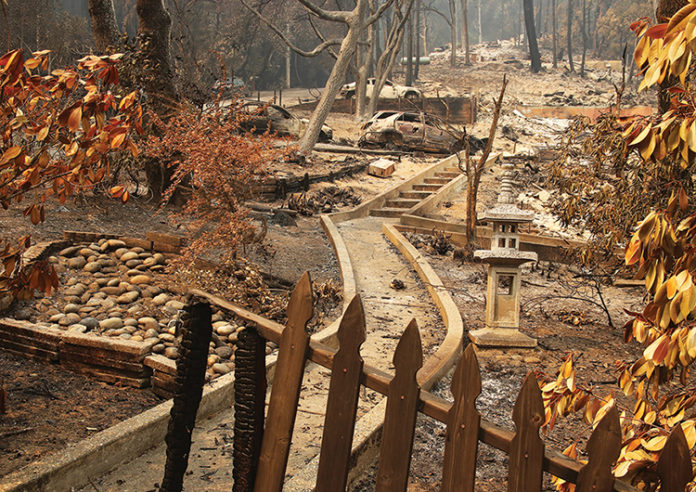
Earlier this year, Jennifer Carrera received notice from her insurance company that they would not renew her insurance, citing the high risks of wildfire in her area.
She then spent more than $10,000 girding her five-acre Corralitos property against fire, including mowing the grasses and moving farming equipment.
“I did more than they asked,” she told the Santa Cruz County Board of Supervisors Tuesday.
But Carrera said she was denied by as many as nine insurance companies per day, until one suggested she apply for the California FAIR Plan, a policy managed by a conglomeration of insurance companies for businesses and residences in fire-prone areas, where finding traditional insurance is difficult.
She is one of thousands countywide who are facing similar troubles finding insurance companies willing to write them policies.
Some 3% of policyholders statewide are covered by the FAIR Plan, according to California Insurance Commissioner Ricardo Lara.
But that policy is considered a last resort, and it can be expensive. Carrera said she cannot afford the annual $9,000 price tag.
“I can’t rebuild for what they’re going to cover for $9,000,” she said. “I don’t think that’s a very fair plan.”
The Supervisors were hearing a presentation from California Department of Insurance spokesman Richie M. Sayavong, who said that Lara’s office is working to make getting an insurance policy easier.
That can be hard in a time when climate change is fueling numerous fires statewide, making insurance companies increasingly skittish about writing policies for property owners.
“We’re in a very stuck crossroads when it comes to insurance, and what we are trying to do in the Department of Insurance is reassure Californians that help is on the way,” Sayavong said.
But with the risk of wildfires growing, the problem is likely to get worse, as insurance companies look to recoup their losses, he said.
“Californians are going to see a bit of a rate increase,” he said.
A large part of the problem, Sayavong said, is the limited choices consumers have when seeking coverage for their property, with the 12 largest companies controlling 85% of the market. Of those, he said, seven have either paused or restricted new policies.
The FAIR Plan, Sayavong said, has its own problems, because it concentrates the highest-risk properties, increasing the chance it will be unable to afford another catastrophic event.
If that plan becomes insolvent, he said, the insurance companies will be on the hook for the unpaid losses, which will likely affect their other customers.
“That uncertainty is driving insurance companies to further limit at-risk coverage to Californians,” he said. “So the FAIR Plan creates risk for everyone.”
Sayavong said that Lara’s office is looking to ease that problem with the Safer From Wildfires regulation, a first-of-its-kind system that requires insurance companies to give insurance discounts to property owners who make safety improvements.
This includes clearing trees and brush, improving roofs and moving sheds and outbuildings away from the main buildings.
The goal, he said, is for insurance companies to eventually approve at least 85% of new policies and “close the insurance gap.”
While the Department of Insurance does not have the power to force insurance companies to write policies, the plan attacks the root cause of the non-renewals, Sayavong said.
Lara’s regulation has also allowed consumers to obtain their property’s fire risk score, and to appeal the score when they perform mitigation. He has also expanded FAIR Plan insurance coverage to $20 million per location.
Anyone who has received a non-renewal notice from their insurance company, or needs other help, can call the California Department of Insurance at 800-927-4357.
Financing
In other action, the supervisors approved a plan to issue $95 million in lease revenue bonds to pay off debts accrued from dealing with natural disasters over the past three years.
“This is without a doubt the most complicated, largest, most complex capital debt this county has ever issued,” County Budget Manager Marcus Pientel said.
This includes $65 million for the storms of 2022 and 2023 and $9 million from the CZU Lightning Complex Fires and $11 million for new projects, such as the new government services center in Watsonville.
Much of the existing debt comes as the county awaits for $125 million in reimbursement from the Federal Emergency Management Agency, said County Administrative Officer Carlos Palacios.
“This money was already spent in emergency response,” he said. “We did that in good faith assuming that we were going to get reimbursed in a timely fashion by FEMA.”
The level of debt left the county with little recourse, Palacios said.
“The only alternative would be to do very difficult and severe budget cuts in our general fund,” he said. “That would be very devastating to the community. These would be very deep cuts, and I would not recommend that.”











Good article-
– The mantra of “climate change” ignores a century of fire mismanagement policies.
-While some responsible property owners do maintain w/ brush clearing, etc.., many properties
are fire storms waiting to happen because vegetation management has been ignored for decades.
Unfortunately, the insurance companies look at broadly sculpted fire maps to decide who will be offered insurance and not looking at the condition of the properties themselves.
I spend many hours and thousands of dollars each year on brush removal, tree pruning, mowing, etc.
on my property, while neighboring parcels are overgrown infernos waiting for a spark or errant cigarette tossed from a car.
How about rewarding responsible property owners for fire maintenance (tax incentives, etc..) and strongly encouraging others to do the same???
So cheesy to fish for free advertisements….